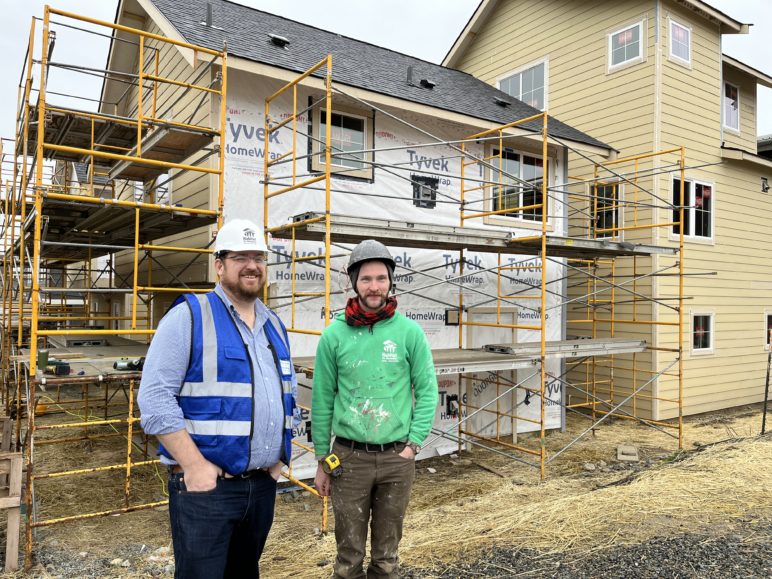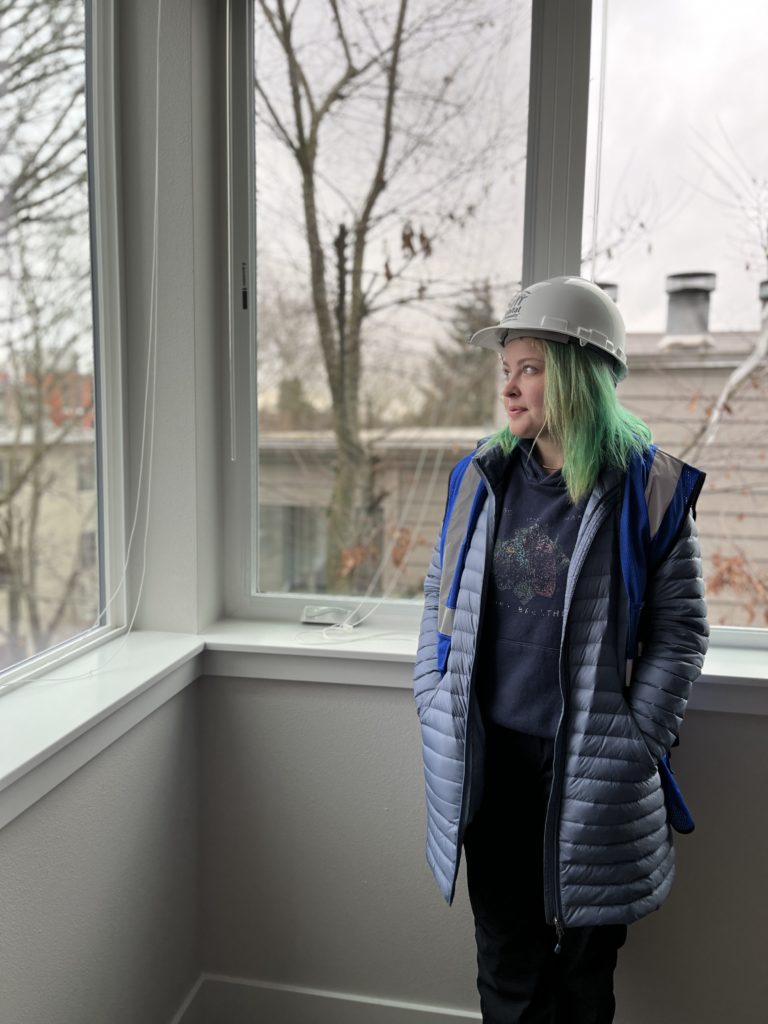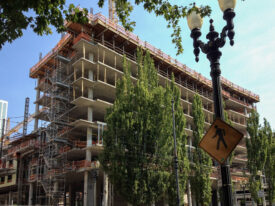According to Ryan Donohue, there is only one way to solve the shortage of affordable homes in Washington: widescale zoning reform that legalizes multifamily housing without onerous parking mandates, and an influx of public funding to match.
“If we don’t solve both of these problems, we will never be able to solve the housing crisis,” explained Donohue, the Chief Advocacy Officer for Habitat for Humanity Seattle-King & Kittitas Counties (“Habitat SKKC”), Washington’s largest Habitat for Humanity chapter.
All across Washington state, people need more homes of all kinds. One million more, the Department of Commerce estimated, by 2044. But local exclusionary zoning laws adopted by city and county governments between 1920 and 1980 have restricted homebuilders’ ability to meet demand. Bans on apartment buildings, townhomes, and duplexes, combined with costly parking mandates, have contributed to Washington having the fifth worst undersupply of housing in the United States.
But simply re-legalizing those lower-cost options won’t automatically put homeownership within reach for everyone, since prices have already been pushed so high. Since 2010, the median home price in Washington has increased 250 percent. “Subsidy is simply a necessity,” said Donohue. “If it’s going to be affordable at or below 80 percent area median income, it’s going to need public dollars.” In the absence of coordinated action by lawmakers, the shortage of affordable housing has grown into a billion-dollar problem, instead of just a million-dollar one.
That all might start to change this year. Legislators in Olympia have proposed a suite of pro-housing legislation this session that would increase housing supply through state zoning standards, reduce parking requirements and permitting barriers, increase renter protections, and reduce fees for affordable housing. Governor Jay Inslee is currently touring the state to build support for a $4 billion dollar housing bond.

Ryan Donohue (left) and Brenden Lersch (right) at the Highland Terrace project, which will provide 12 new homes through a combination of primary structures and accessory dwelling units.
Habitat’s move to multifamily
When most people think of Habitat, Donohue explained, they see a detached home with a white picket fence and a grass yard and kids playing. “While that’s a beautiful picture,” Donohue said, “the reality is—especially in King County, but really across the state—that isn’t the case anymore and hasn’t been for years.”
Habitat SKKC now focuses on townhomes and condo buildings. The cost of land has gotten too expensive to only build one home per lot. Even the smallest project in Habitat’s three-year pipeline will include seven residences in just two buildings.
“We are living in more segregated neighborhoods today than we ever did at the end of redlining… based on land use codes.” –Ryan Donohue, of Habitat for Humanity Seattle-King and Kittitas Counties

More ambitiously, Habitat SKKC is currently planning the largest single-building Habitat project in the world, siting 58 new homes within eyeshot of the Columbia City light rail station in South Seattle.
But opportunities to build at that scale are hard to find. In Seattle, only 25 percent of the city’s residentially zoned land allows the lower-cost multifamily housing Habitat can build. It didn’t always used to be that way. One hundred years ago, multifamily housing was allowed throughout Seattle. But decades of zoning policies rooted in racial exclusion have confined these types of homes to discrete areas of the city.
“We are living in more segregated neighborhoods today than we ever did at the end of redlining,” said Donohue. “We’re essentially creating our own new version of segregation in our cities and states based on land use codes.”
Habitat has been an ardent supporter of housing bills like HB 1110, which would lift detached-house (or “single family”) zoning restrictions, re-legalizing duplexes and fourplexes in communities across the state.

Veronica Fleming looks out the window of her new home, currently in the last stage of construction. Photo by Catie Gould.
The new starter home
“I understand how important housing is. Once you have that stability, you can take on the world.” –Veronica Fleming, future homeowner in Habitat’s “Capitol View” building

Veronica Fleming, 26, never expected to own a home. She never expected to plan for a long-term future at all, having been born with cystic fibrosis, a rare and life-threatening genetic disorder. That was until a new treatment was approved in 2019 that changed everything. She moved across the country to Seattle, where she has worked with autistic children and is currently a housing case manager for low-income clients.
“I understand how important housing is,” said Fleming. “Once you have that stability, you can take on the world.” Renting has been hit or miss for Fleming, who estimated she has moved to a new apartment nearly every year in the past six or seven years.
In March she will get the keys to move into her own home, a 13-unit condo building in the Capitol Hill neighborhood named “Capitol View.” Her mortgage will be $110 less each month than what she is currently paying in rent in the neighborhood and allow her to start building equity.
Currently, the average Habitat homebuyer is in their mid-thirties, but Habitat would like to get people onto the housing ladder earlier. The organization wants people like Fleming to start building wealth for themselves and their families.
Donohue doesn’t think new homebuyers like Fleming will want to stay in her one-bedroom home forever. “That’s not the intention,” he said. “The hope on our end is that they are there for eight to ten years, and they sell it back to us.” At that point in life, maybe those residents are ready to start a family or seeking something bigger or different. “That’s a success right there, helping people getting started on the housing continuum.”
Habitat typically sees 10 to 12 applications for every home it builds, but interest in housing of this smaller size has been strong. “We’re finding that the demand for one- and two-bedroom ownership units is just incredible,” said Donohue.
Parking flexibility provides less expensive housing options
Homecoming stories like Fleming’s are only possible because Seattle started eliminating mandatory parking minimums near transit in 2006.

Homecoming stories like Fleming’s are only possible because Seattle started eliminating mandatory parking minimums near transit in 2006. A study later found that only 30 percent of new residential buildings without parking requirements did not include any off-street parking. Capitol View is part of that minority.
The choice was a simple one. “If we had to do parking there, it wouldn’t have been possible,” Donohue said. At 350 square feet needed for each parking space, even a small parking lot quickly would have overtaken the 4,000-square-foot property. “Our mission and our goal is to build a world where everyone has a safe, decent, affordable place to call home. ‘Everyone’ doesn’t include cars,” said Donohue. In other areas of the city, the same building would have required one parking space for every unit, whether residents use them or not.
Fleming has never even owned a car. “I’m not a fan of driving,” she said, “and that’s another expense that I don’t really have the money for.” Between the insurance, maintenance, and parking costs, it always felt like a waste of the precious time and money she had. “Personally, it just doesn’t seem worth it.” Capitol View residents that do own cars can buy a street parking permit from the city for less than $100 per year.
More housing opportunities on the horizon
The reason why affordable housing is so often located in Seattle, Donohue explained, is that the two essential ingredients already exist: 1) more housing types that are legal to build, with flexibility on parking, and 2) public funding through the Seattle Housing Levy. “Practically speaking, we can build it there. The projects go where the money is,” said Donohue.
Even with an influx of state funding, Capitol View is illegal to build in many other parts of Habitat SKKC’s service area. A new report from the Urban Land Institute found that in the Puget Sound region, a third of the land within a half-mile of frequent transit is zoned exclusively for single-detached homes. On more than half of the residential land near transit, the construction of new housing depends on a pre-determined number of accompanying parking spots.
“Our mission and our goal is to build a world where everyone has a safe, decent, affordable place to call home. ‘Everyone’ doesn’t include cars.” –Ryan Donohue, of Habitat for Humanity Seattle-King and Kittitas Counties, on how parking flexibility supports more affordable homes
But that could soon change with Senate Bill 5466, which would legalize five-story buildings and lift parking mandates within a half-mile of frequent transit stations across the state. It just passed the Senate floor on March 1 with a bipartisan 40–8 vote in support.
Many of the housing bills introduced in Washington in 2023 gave flexibility over parking needs back to homebuilders. But a fear of inadequate parking supply remains a contentious issue. A late amendment to SB 5466 offered an exemption to cities who make a determination that on-street parking is infeasible, which could continue to limit the lower-cost housing options available to Washingtonians.
“Seattle doesn’t really require parking near transit already. Bellevue does. Kent does. Renton does. All of these other places [in King and Kittitas counties], generally speaking, do require parking,” said Donohue. “And that’s going to be incredibly difficult to build affordable housing in those spaces because of it.”











Alan Bunin MD
Allowing intrinsically affordable housing is much more sustainable than subsidizing unaffordable ones.